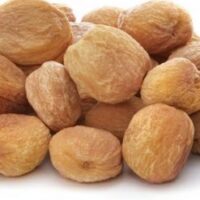Apricots (Prunus armeniaca) are stone fruits also known as Armenian plums and they are yellowish pink apricot.
Round and yellow, they look like a smaller version of a peach but share the tartness of purple plums.
They’re extremely nutritious and have many health benefits, such as improved digestion and eye health.
Dried apricots are a type of traditional dried fruit. When treated with sulfur dioxide (E220), the color is vivid orange. Organic fruit not treated with sulfur vapor is darker in color and has a coarser texture. … Small apricots are normally dried whole. Larger varieties are dried in halves, without the kernel or stone.
Apricots are a fruit with a ton of health benefits and which have been growing in popularity since… well.. No-one is really sure. One thing we do know? Apricots have a fascinating history from their richness in vitamins and minerals to being mistaken as an aphrodisiac in the times of William Shakespeare.
1. The origins of apricots are lost in time
Apricots have been a valued food for so long that just where and when they were first domesticated are facts lost in time.
The scientific name Prunus Armeniaca links them to Armenia where they have certainly been grown for centuries and where fifty varieties are produced today. They were also a major crop in ancient Persia (modern Iran) and while some authorities insist their cultivation history begins in India as long ago as 3000 BC others argue it all began in China.
2. Apricots are a recommended health food
Obviously dried apricots count as one of your five a day. The recommended portion is 30gms (3 or 4 apricots).
All dried fruit contains the same nutritional qualities as the original fresh fruit. In fact, weight for weight the dried form contains more of the antioxidants, minerals and fibre than the raw original. So dried apricots are recommended, including by the NHS for their health benefits which include important levels of Vitamins A and C, fibre and minerals.
3. Apricots are a great source of fibre
Apricots are a great source of fibre the element in our diet which most of us neglect yet which can help prevent heart disease, diabetes, weight gain and some cancers.
Three whole dried apricots contain 5gms of fibre which is around 20 per cent of your daily fibre requirement. Usefully the apricot fibre is shared half and half between the soluble and insoluble types.
As well as aiding the digestive system, insoluble fibre is linked with reducing bowel cancer risk. Soluble fibre combines with cholesterol, prevents it being absorbed and carries it out of the body.
4. Apricats contain carotene – a form of vitamin A
Vitamin A is essential for maintaining the structure and function of the skin and mucous membranes. It comes in two forms. Retinol is found in animal derived foods and carotenoids found mainly in plants.
It is the beta carotene in apricots that makes them such a notable source of the carotenoid benefits which may include helping to protect the eyes from age-related damage. But this is a fruit that also contains catechins which have helped earn green tea its positive reputation.
Showing all 3 results



